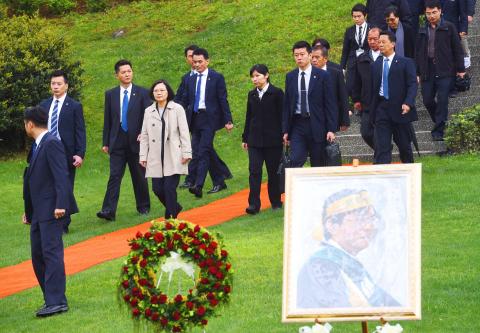President Tsai Ing-wen (蔡英文) yesterday stressed the importance of transitional justice, saying that it is the most important step following the democratization of Taiwan.
It is important the nation gets transitional justice right, Tsai said at an event hosted by the Deng Liberty Foundation at Chinpaoshan Cemetery (金寶山) in New Taipei City to commemorate democracy activist Deng Nan-jung (鄭南榕).
“While the world already associates Taiwan with democracy, there is one missing element, namely achieving transitional justice,” she added.

Photo: Peter Lo, Taipei Times
“The process — which is rooted in uncovering the truth, taking responsibility and social reconciliation — is one her administration has long championed,” she added.
The Legislative Yuan passed the Act on Promoting Transitional Justice (促進轉型正義條例) in December last year. It requires the government to set up a committee to implement transitional justice measures.
The first thing the transitional justice promotion committee would do once established is research what happened when the then-Chinese Nationalist Party (KMT) regime governed the nation under martial law from 1945 until 1992, Tsai said.
The appointed committee nominees are to undergo legislative review before their confirmation.
The committee measures up to the transitional justice teams of other nations, Tsai said, adding that she looks forward to lawmakers’ support of its members.
“Whether Taiwan could be a democratic nation was something Deng cared about deeply,” Tsai said, adding that he would likely find it comforting knowing that Taiwan was ranked among the world’s “free” nations this year in Freedom House’s annual report, in which Taiwan garnered an aggregate score of 93 out of 100, up two points from last year.
On April 7, 1989, Deng, then editor-in-chief of Freedom Era Weekly (自由時代週刊), set himself alight as heavily armed police attempted to break into his office following 71 days of self-imposed isolation after he was charged with sedition for the stance his magazine took against the government after it published a draft Taiwan Republic Constitution in 1988.
In 2016, the Executive Yuan declared April 7 Freedom of Expression Day to commemorate Deng’s death.

SECURITY: As China is ‘reshaping’ Hong Kong’s population, Taiwan must raise the eligibility threshold for applications from Hong Kongers, Chiu Chui-cheng said When Hong Kong and Macau citizens apply for residency in Taiwan, it would be under a new category that includes a “national security observation period,” Mainland Affairs Council (MAC) Minister Chiu Chui-cheng (邱垂正) said yesterday. President William Lai (賴清德) on March 13 announced 17 strategies to counter China’s aggression toward Taiwan, including incorporating national security considerations into the review process for residency applications from Hong Kong and Macau citizens. The situation in Hong Kong is constantly changing, Chiu said to media yesterday on the sidelines of the Taipei Technology Run hosted by the Taipei Neihu Technology Park Development Association. With

CARROT AND STICK: While unrelenting in its military threats, China attracted nearly 40,000 Taiwanese to over 400 business events last year Nearly 40,000 Taiwanese last year joined industry events in China, such as conferences and trade fairs, supported by the Chinese government, a study showed yesterday, as Beijing ramps up a charm offensive toward Taipei alongside military pressure. China has long taken a carrot-and-stick approach to Taiwan, threatening it with the prospect of military action while reaching out to those it believes are amenable to Beijing’s point of view. Taiwanese security officials are wary of what they see as Beijing’s influence campaigns to sway public opinion after Taipei and Beijing gradually resumed travel links halted by the COVID-19 pandemic, but the scale of

A US Marine Corps regiment equipped with Naval Strike Missiles (NSM) is set to participate in the upcoming Balikatan 25 exercise in the Luzon Strait, marking the system’s first-ever deployment in the Philippines. US and Philippine officials have separately confirmed that the Navy Marine Expeditionary Ship Interdiction System (NMESIS) — the mobile launch platform for the Naval Strike Missile — would take part in the joint exercise. The missiles are being deployed to “a strategic first island chain chokepoint” in the waters between Taiwan proper and the Philippines, US-based Naval News reported. “The Luzon Strait and Bashi Channel represent a critical access

Pope Francis is be laid to rest on Saturday after lying in state for three days in St Peter’s Basilica, where the faithful are expected to flock to pay their respects to history’s first Latin American pontiff. The cardinals met yesterday in the Vatican’s synod hall to chart the next steps before a conclave begins to choose Francis’ successor, as condolences poured in from around the world. According to current norms, the conclave must begin between May 5 and 10. The cardinals set the funeral for Saturday at 10am in St Peter’s Square, to be celebrated by the dean of the College